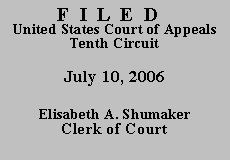

| GARRY ENSEY, also known as
Garry Dean Ensey,
Petitioner-Appellant, v. MIKE MULLINS, Warden, Respondent-Appellee. |
|
To obtain a COA under [28 U.S.C.] § 2253(c), a habeas prisoner must make a substantial showing of the denial of a constitutional right, a demonstration that . . . includes showing that reasonable jurists could debate whether (or, for that matter, agree that) the petition should have been resolved in a different manner or that the issues presented were adequate to deserve encouragement to proceed further.
Slack v. McDaniel, 529 U.S. 473, 483-84 (2000) (citation and quotation omitted).(1)
Having carefully considered Mr. Ensey's application for a COA and his opening brief, the record, and the applicable law, we determine that he has not made a substantial showing of the denial of a constitutional right. Accordingly, we DENY his request for a COA and DISMISS the appeal.(2)
Entered for the Court
Chief Circuit Judge
1. We do not consider Mr. Ensey's assertion that his right to a speedy trial was violated under the Oklahoma Constitution and Oklahoma's statutory provision concerning speedy trials, Okla. Stat. tit. 22, § 812.1. See Estelle v. McGuire, 502 U.S. 62, 67-68 (1991) ("[I]t is not the province of a federal habeas court to reexamine state-court determinations on state-law questions.").
2. Mr. Ensey filed with this court a request to proceed in forma pauperis (ifp). He was granted permission to proceed ifp in the district court. R., Doc. 18. Since the district court did not certify in writing that his appeal was not taken in good faith, 28 U.S.C. § 1915(a)(3), his ifp status continues in this court without further order. See Fed. R. App. P. 24(a)(3). His ifp request is therefore denied as moot.